The UPSC GS 3 is one of the nine subjective papers of UPSC Mains. The subjects asked in the GS Paper 3 are Economic Development, Technology, Biodiversity, Environment, Security, Disaster Management. This article will provide you with the detailed GS 3 syllabus and structure for the preparation of the IAS Exam.
This article will give a GS preparation strategy for IAS, syllabus, and structure of GS-I, GS-III and GS-IV from the links mentioned below:
| UPSC Mains GS-I Strategy, Structure & Syllabus |
| UPSC Mains GS-II Strategy, Structure & Syllabus |
| UPSC Mains GS-IV Strategy, Structure & Syllabus |

Table of Contents:
IAS Mains GS Paper 3
The GS 3 Syllabus is focussed on the following subjects::
- Technology
- Economic Development
- Biodiversity
- Environment
- Security
- Disaster Management
As we can see, there is scope for significant overlap between the topics covered in General Studies II and General Studies III. Candidates preparing for UPSC 2022, can check the linked article.
Strategy for UPSC Mains GS 3

|
Focus Areas in GS Paper-III |
|
| Subject | Topics |
| Economics |
|
| Science & Technology |
|
| Biodiversity |
|
| Security |
|
| Disaster Management |
|
The following table will mention the important sources which an aspirant can refer to prepare for UPSC Mains GS-III:
|
Subject |
Sources |
| Economic Development |
|
| Biodiversity, Environment |
|
| Technology | Current Affairs |
| Security & Disaster Management |
|
Quick Tips to prepare for GS Paper 3:
- Focus on Current Affairs – Many topics from IAS Mains GS-III overlap with current affairs and hence, aspirants can take help from the below-mentioned links to prepare accordingly:
- Make notes on blank sheets of paper, or alternatively on an unruled notebook – Draw margins on both sides of the paper, as this familiarizes you with the format of the answer booklet given to candidates appearing for the Mains Examination.
- Use Mnemonics wherever possible – You can create mnemonics that work for you. For Example, the schemes under, ‘Bharat Nirman’ can be memorized using the mnemonic ‘WRITE H’- wherein each alphabet denotes one component, i.e. W: Water, R: Roads, I: Irrigation, E: Electricity, T: Telephone, and H: Housing.
- Use illustrations while making notes – You can use sticky notes for drawing brief diagrams, flowcharts, etc. which you can then paste on the textbook page you are referring to, or on the notebook you are maintaining for points that you are jotting down from the tablet. This will help during revision.
- Get answers to even the most minute doubt related to economy, science, environment or agriculture from BYJU’S education portal. The links are mentioned below:
Questions from each of the above-mentioned topics are asked in general studies 3 paper. To get the topic wise GS 3 questions in UPSC Mains, you can check the linked article. These questions can help aspirants devise a strategy to prepare for each of the GS-II topics.
GS 3 Structure for UPSC
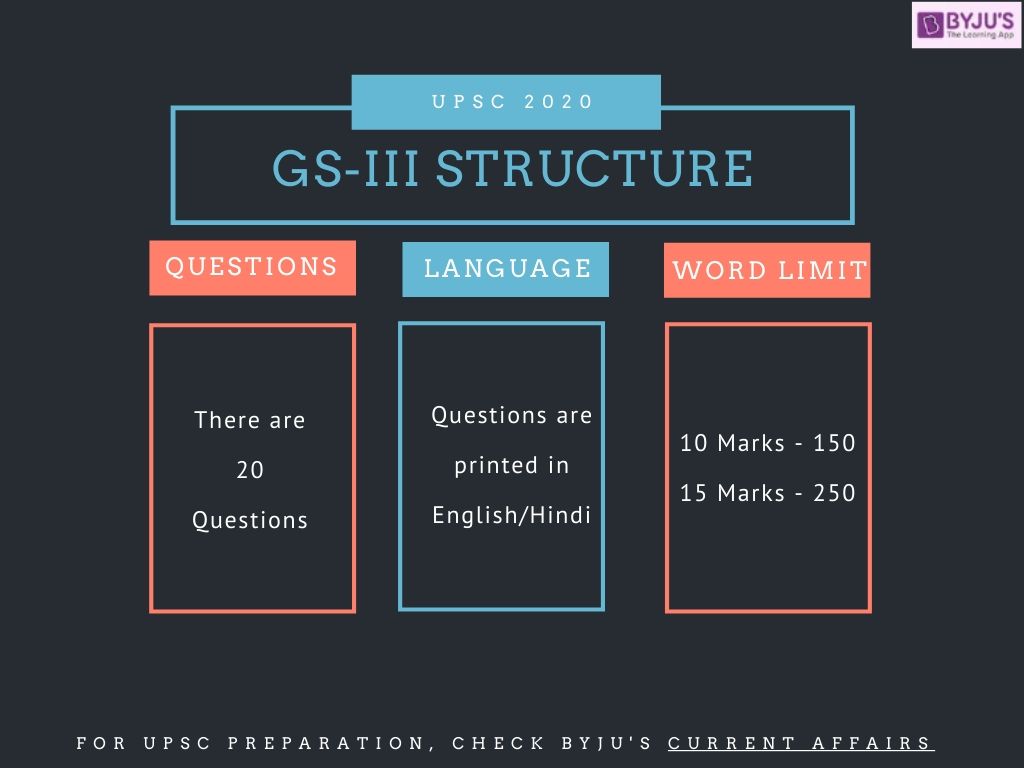
Detailed Structure of Mains General Studies Paper-III for IAS
The major features of the General Studies Paper III in Mains Exam are:
- There are 20 questions printed in both English and Hindi, the questions can be answered only in the language specified during application.
- The paper is of a total of 250 marks.
- The word limit for 10 marks questions is 150 and, for 15 marks is 250.
- The paper has a special emphasis on Economic Development, so it is expected to have questions answers to which would theoretically spill over to Social Justice and international relations from GS II. Also, the questions from Environment may have some overlap with the Geography knowledge required for GS-I and Economic Development and Biodiversity from GS II itself. Due to this, analyzing each question and writing to the point answers within the word limit is important. A careful analysis of the UPSC GS 3 Syllabus will help in this regard.
- The questions related to Security and disaster management are mostly asked in the second half of the paper, so it is important to brush up on topics related to Internal Security and Disaster Management as well as new age topics like cybercrime.
Get the Strategy for Mains GS Paper III in the linked article.
It is always advisable to check IAS Toppers of previous years’ exams so as to know their strategies to ace the examination.
IAS GS 3 Syllabus – Detailed Syllabus of Mains GS Paper 3
The following is the detailed Syllabus for General Studies III Paper in the UPSC Mains Examination:
| Topic | Subtopic |
| Indian Economy |
Download previous years’ Indian Economy Questions from the linked article. |
| Inclusive Growth |
|
| Budgeting |
|
| Major Crops and Cropping Patterns |
|
| Subsidies, Poverty Alleviation and Agricultural Technology |
Refer to Agriculture Questions from UPSC Mains GS 3 in the linked article. |
| Food Processing and Related Industries |
|
| Land Reforms |
|
| Liberalization |
|
| Infrastructure |
|
| Investment |
|
| Science and Technology |
Take help from Science & Technology Questions from UPSC Mains GS 3 provided in the linked article. |
| Achievements of Indians in Science and Technology |
|
| General Awareness |
|
| Environment |
Previous years’ Environment & Ecology Questions from UPSC Mains GS 3 can be checked in the linked article. |
| Disaster Management |
The Old Disaster Management Questions from UPSC Mains GS 3 are compiled in the linked article. |
| Security |
Mentioned Security Questions from UPSC Mains GS 3 in the linked article can be helpful. |
Aspirants can find the complete GS 3 Economics syllabus for UPSC from the links mentioned in the table below:
| Economics Optional Syllabus for UPSC | Economics Syllabus for IAS Mains |
As we can see from the syllabus, internal security occupies a major part of the syllabus along with agriculture and related topics. Hence, aspirants can read the strategy for internal security and disaster management topics for GS 3 in the linked article.
While preparing for the General Studies Paper III., it is very important to look at the trends from the previous papers to understand the pattern of questions.
GS-III Trend Analysis
Here, we are giving the GS 3 trend analysis for the years 2018, 2019 and 2020. UPSC candidates can read the detailed trend analysis of UPSC Mains GS Paper 3 from 2013 to 2016 in the linked article.
| Topic | 2018 | 2019 | 2020 |
| Economy | 50 | 50 | 50 |
| Agriculture/Food industry | 60 | 55 | 50 |
| Science/Tech/Environment/Disaster | 100 | 100 | 100 |
| Security | 40 | 45 | 50 |
| Total | 250 | 250 | 250 |
Now, we analyze each broad category by classifying them into subtopics:
Economy Trend Analysis
The following graph indicates the worth of the total mark of questions asked from each subtopic in 2020:

The following graph indicates the worth of the total mark of questions asked from each subtopic in 2018 and 2019:
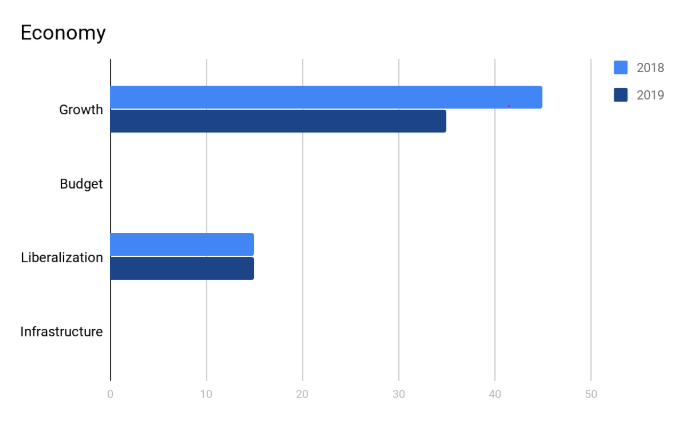
Agriculture Trend Analysis
The following graph indicates the worth of the total mark of questions asked from each subtopic in 2020:

The following graph indicates the worth of the total mark of questions asked from each subtopic in 2018 and 2019:
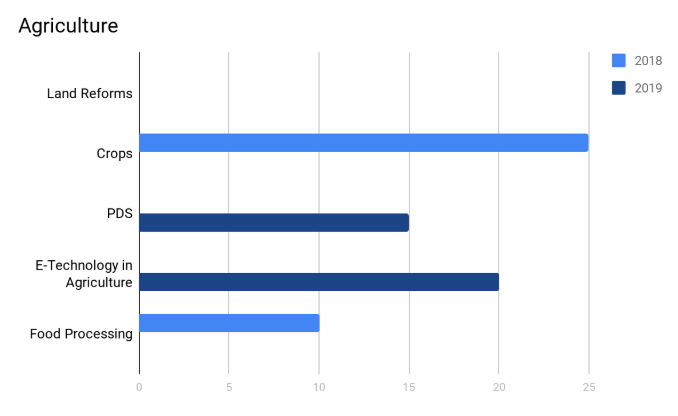
Science & Technology, and Environment Trend Analysis
The following graph indicates the worth of the total mark of questions asked from each subtopic in 2020:

The following graph indicates the worth of the total mark of questions asked from each subtopic in 2018 and 2019:
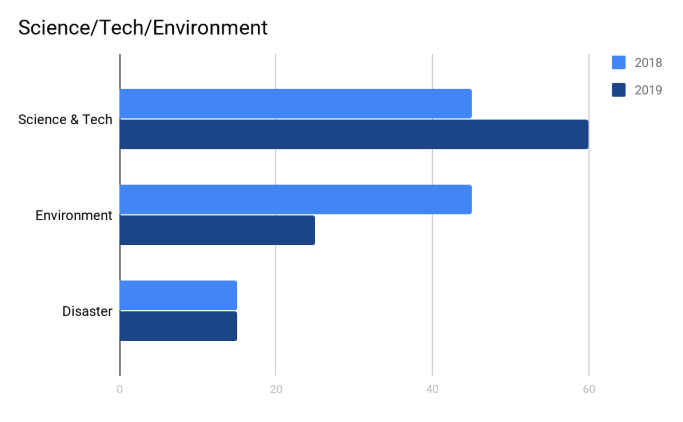
Security Trend Analysis
The following graph indicates the worth of the total mark of questions asked from each subtopic in 2020:

The following graph indicates the worth of the total mark of questions asked from each subtopic in 2018 and 2019:
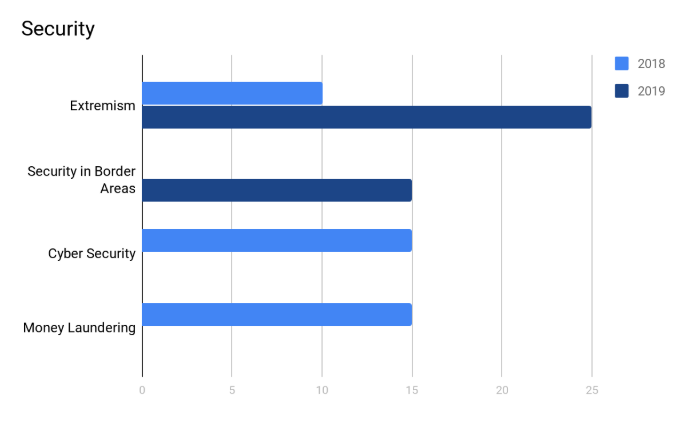
IAS aspirants can check the UPSC Prelims Subject-Wise Weightage 2011-2019 in the linked article.
Must-Read Important Topics in GS-III for UPSC
The table below mentions the GS-III topics that are important for IAS Exam:
| Indian Economy | Inclusive Growth |
| Budgeting | Major Crops |
| Subsidies, Agriculture | Food Processing |
| Land Reforms | Liberalization |
| Infrastructure | Investment |
| Science & Technology | Environment |
| Disaster Management | Security |
Aspirants can get other important Science & Technology notes for UPSC in the linked article.
The full UPSC GS 3 syllabus can be downloaded from the IAS Notification by downloading its PDF given in the linked article.
IAS Exam Pattern
Check the table below to understand the scheme and subjects of IAS examination:| UPSC IAS Exam | Pattern of IAS Exam |
| Preliminary Examination |
|
| Mains Examination |
|
| Personality Test | – |
The UPSC Civil Services Mains Examination consists of 9 papers conducted over a period of 5 days. Out of these, the first two papers – English and compulsory Indian language, are qualifying in nature. Candidates have to secure at least 25% marks in these two to be eligible for merit ranking, based on the rest of the UPSC Mains papers and the interview.
Candidates can understand the complete UPSC Exam Pattern from the linked article.
IAS aspirants may also check out the following links for more General Studies resources for UPSC IAS preparation:
Hey, Your article was really very good. Got lots of information from it and also you put much value on it. It looks very comprehensive as well. Good Work.
Thank You
your content is very helpful
It was very comprehensive and in-depth analysis.
Thank you BYJU’s.
Your platform is literally good, someone who preparing online at home for those this is good platform